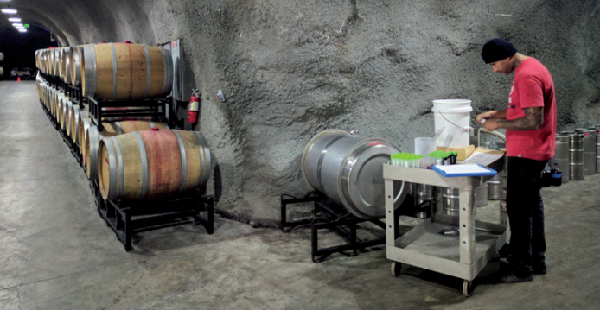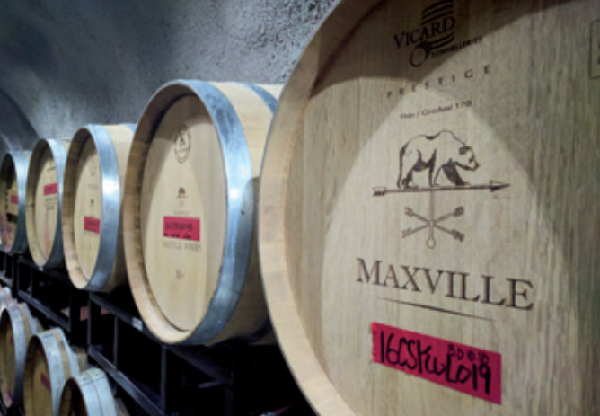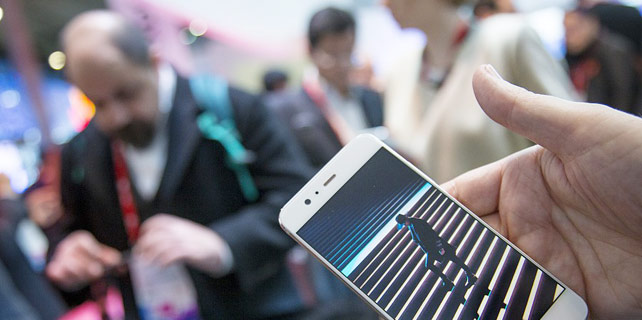Reviving a winery in Napa Valley
 |
|
A Maxville Winery worker retrieves a wine sample for a laboratory test in a facility for aging.Photos By Lia Zhu / China Daily |
When Anthony Hsu first visited the property - an old summer camp and a defunct winery in the Chiles Valley District of Napa Valley - nobody was around except a few coyotes. The winery was dark and outdated.
Now the winemaking facility and tasting room that date back to the 1970s and remained defunct for many years welcome visitors.
Maxville Winery, a subsidiary of China's Qinghai Huzhu Barley Wine Co, Ltd, purchased the property in 2014 and then remodeled it and the surrounding property extensively in 2016. A tasting room recently opened to visitors.
"When the company was taken over, we made a big drastic decision," said Hsu. They chose to get into the challenging wine business in which they had zero experience over the easy decision to just sell the grapes.
Maxville has more than 100 acres of vineyard planted, primarily cabernet sauvignon, cabernet franc, sauvignon blanc and petite sirah. An additional nearly 1,000 acres are within the Napa Valley Land Trust, which guarantees the land will never be subdivided.
Chiles Valley is well above the Napa Valley floor, with Maxville Lake's vineyards at elevations between 900 and 1,200 feet. Afternoons are sunny and warm, but nighttime temperatures plunge. A longer growing season encourages full phenolic maturity, giving the grapes tremendous complexity.
The 32,000-square-foot winery, started production in 2014 and sales began in 2016. Most of its wine is sold in China under the brand name "Maxville Lake".
"As the Chinese consuming habit is changing, the wine market will see an explosive growth," said Li Yinhui, chairman of Qinghai Huzhu Barley Wine. "The current wine market size is $11.7 billion, but it's expected to reach $30.7 billion in three years."
In 2016, imported wine increased and domestic products decreased in China, according to Li. "Since wine originates from the West, Chinese consumers are willing to pay more for foreign brands," he said.
 |
|
The wine is aged in barrels for 18 to 20 months . The winery tops the barrels each month to replace what is lost by evaporation through the staves.Photos By Lia Zhu / China Daily |
Maxville wine targets two types of consumers in China: the introductory level and the medium- to high-end level.
"Our wine looks bright in color and tastes sweet, which attracts the introductory level consumers," said Li. But he was not satisfied with the performance in China, despite the 20,000 cases of sales in the first year. "Our goal is 100,000 cases a year," he said.
The biggest competitors are from France, Australia and Chile. US-made wine has minimal influence in the Chinese market, which is still dominated by French wine.
"The US wine takes only about 3 percent of the market, which does not match the country's economic status," said Li. He said he expected the market share to increase to 20 percent as exchanges deepen between the two countries.
"We will seize the huge market potential to play a pioneer role and build Maxville into a representative brand for the US-made wine in China," said Li.
The company has entered into a long-term partnership with Terlato Wines to distribute Maxville wines in the US.
Four Maxville wines handcrafted by Bordeaux-born winemaker Camille Benitah made their US debut early this year - cabernet sauvignon, petite sirah and cabernet franc ranging from $55 to $66 and sauvignon blanc at $33.
Three of the wines have recently received ratings of 90 points or higher from Wine Enthusiast, one of the most influential publications. Maxville 2014 petite sirah received 93 points, the 2015 sauvignon blanc received 91 points and 2014 cabernet franc received 90 points.
"These are exceptional wines from a must-see destination winery. They stand with Napa Valley's finest wines," said William Terlato, CEO of Terlato.
Maxville has invested $35 million in the development of the winery, including the acquisition of the property.But the long-term strategy will span at least 30 years to build the winery into a "bridgehead" for Chinese enterprises wanting to go global as well as a base for Chinese wine companies to learn US culture.
Qinghai Huzhu, the parent company, also plans to introduce its liquor to the US market and eventually into the world. Its main products include highland barley wine, low-alcohol highland barley wine and distilled liquor..
The company's liquor under the name "Tianyoude" has been certified by the US Alcohol and Tobacco Tax and Trade Bureau. It won the Silver Medal at the 2016 Los Angeles International Spirits Competition.
"The Chinese have been making liquor for thousands of years but its liquor takes up less than 0.17 percent of the world's liquor market," said Li. "The global market is a blue ocean for Chinese liquor."
liazhu@chinadailyusa.com









